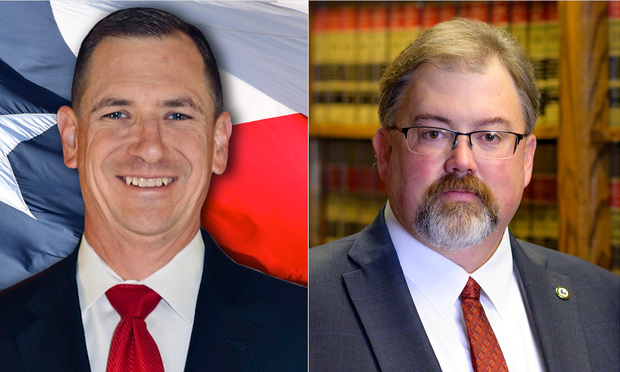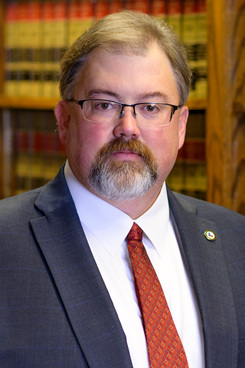Tom Brummett, Douglas Freitag Want Your Vote for Judge of Lubbock's 140th District Court
Both Tom Brummett and Douglas Freitag spent most of their careers in district attorneys offices. But now, Frietag argues that his time in private practice better qualifies him for the 140th District Court in Lubbock.
June 24, 2020 at 12:29 PM
8 minute read
 Left to right: Douglas Freitag and Tom Brummett. Courtesy photos
Left to right: Douglas Freitag and Tom Brummett. Courtesy photos
Two longtime prosecutors are vying for the Republican nomination for Lubbock County's 140th District Court.
Both prosecutor Tom Brummett and criminal-defense attorney Douglas Freitag spent most of their careers in district attorneys offices. But now, Frietag argues that he's also spent time in private criminal-defense practice, which better qualifies him for the bench.
Whoever wins the Republican runoff will take the bench in 2021, since there's no Democratic opponent in November.
Texas Lawyer is publishing Q&As with the judicial candidates running in primary runoffs. Early voting runs from June 29 to July 10, and election day is July 14.
"I am the only candidate for the July 2020 runoff election that has practiced in the areas of criminal defense, family law, probate matters, and civil litigation," Freitag wrote. "My opponent has spent his entire career working for the government."
But Brummett counters that his career track shows a dedication to serve the people of Lubbock County.
"I have served the people of Lubbock my entire professional life by fighting crime and trying to make my community a better place. I could have parlayed my legal experience years ago into a far more lucrative pursuit in private practice, but my loyalties have never been for sale," wrote Brummett. "Should I lose this election, I will continue to serve Lubbock with the same dedication in the same capacity."
Here are the Q&A's for Brummett and Freitag.
Read more: Texas Voters: Meet the Candidates Running for Judge in July Primary Runoffs
Tom Brummett
What is a brief biography of work experience, educational qualifications and career honors that you want voters to know about?
 Assistant District Attorney Tom Brummett (Photo: Courtesy Photo)
Assistant District Attorney Tom Brummett (Photo: Courtesy Photo)I received my undergraduate from Texas Tech and my law degree from Indiana University. For the past 17 years, I have served as an assistant district attorney with the Lubbock County District Attorney's office. I practice in all criminal courts and train the new prosecutors in our office. My focus on seeing that justice is done includes many years of recognition from victim advocacy groups throughout Lubbock.
Why do you want this position?
I wish to move into a greater role of service for the community and ensure that the protections afforded those accused of crimes are vigorously enforced and the appropriate punishments are imposed upon those who are convicted.
How are you different or better suited for the bench than your opponent?
I feel I am different from and better suited than my opponent because of my:
- Background: I am a Lubbock native and have spent the vast majority of my life here. My parents live here, my grandparents lived here. My family has deep roots in the practice of law here, including several judges and many lawyers who served the people of West Texas. I know the people, the culture, and what they expect from their judicial system.
- Education: I received my undergraduate degree from Texas Tech University, but was fortunate enough to study law at Indiana Universit, a nationally top #25-ranked law school where, in addition to receiving my JD, I was also editor-in-chief of the Federal Communications Law Journal and president of the Federalist Society.
- Political education: Candidates like to use phrases they think resonate with voters, such as "conservative," "constitutionalist" or "originalist" without truly understanding what those terms mean, or being able to describe them and how they fit within the relationships between people and their government. I have been a student of political philosophy my entire life, and constantly strive to move beyond the *what* those beliefs mean to the *why* and why political thinkers much smarter than I developed them.
- Dedication: I have served the people of Lubbock my entire professional life by fighting crime and trying to make my community a better place. I could have parlayed my legal experience years ago into a far more lucrative pursuit in private practice, but my loyalties have never been for sale, and should I lose this election, I will continue to serve Lubbock with the same dedication in the same capacity.
- Nature of practice: A defense attorney is charged with zealously representing their client to their utmost ability within the boundaries of the law. A prosecutor is charged "to see that justice is done" (Texas Code of Criminal Procedure, Art. 2.01). That pursuit of justice takes all parties and stakeholders into account. Justice may be declining to prosecute a suspect. Justice may be to prosecute a case to make a victim whole, or to get a person struggling with addiction or mental illness help they wouldn't otherwise seek. Justice may be to honor someone killed, dissuade future criminal activity by others, or provide closure for a family. Justice may be dismissal of a case, or to seek punishment that keeps a dangerous and violent offender from leaving more victims in their wake. Seeking justice helps people believe that all are equal before the law and all will have their rights upheld, but all will be held accountable for their actions.
The job of a prosecutor is more akin to what a judge does on the bench — not to consider and fight for what its best for one party, but what is best for all. I have devoted my entire professional life to this ideal and pursuit, and it has prepared me to make the right decisions as a judge.
How would you go about managing this court's docket efficiently and effectively?
- Take the bench at the same time you expect the parties to appear in court. Their time is not less valuable than yours.
- Use focused discretion and truly contemplate all factors before spending the taxpayers' money to appoint counsel.
- Require full disclosure and explanations on all continuances requested. When the need for a postponement is truly needed, it will become obvious.
- Use appropriate judicial authority to try and resolve all contested issues between the parties before asking a jury for their time.
- Prioritize appearances and docket calls to maximize the limited time afforded in each day.
Where can voters go for more information about you?
- Website: www.tombrummett.com
- Resume
Douglas H. Freitag
What is a brief biography of work experience, educational qualifications and career honors that you want voters to know about?
 Douglas Freitag. Courtesy photo
Douglas Freitag. Courtesy photoI graduated from Texas Tech University School of Law in May 2000. I went to work for the district attorney's office out of law school and I have spent almost 12 years working in a prosecutor's office. The remaining time of my legal career has been spent running my own law firm where I do work in the areas of criminal defense, family law, probate, business matters and individual rights.
Why do you want this position?
I am seeking election as Judge of the 140th District Court of Lubbock County, Texas. I am seeking this position because I believe that it is what I am supposed to do. The decision to seek this office was made after conversations with my wife, trusted advisers and much prayer.
How are you different or better suited for the bench than your opponent?
I am the only candidate in this election that has served in the capacity of both an attorney for the government as a prosecutor and as an attorney for the individual in private practice. I am the only candidate (for the July 2020 runoff election) that has practiced in the areas of criminal defense, family law, probate matters, and civil litigation. My opponent has spent his entire career working for the government.
How would you go about managing this court's docket efficiently and effectively?
Dockets continue to grow as there are more and more matters coming into the legal system, but no more weeks added to the calendar. It is important to work hard and move cases as efficiently as possible while doing justice. I believe that it is important to have multiple matters ready for each week in the courtroom so that if something falls through, then there is no, or little, lag time before the next matter can be started.
Where can voters go for more information about you?
- Website: www.freitagforjudge.com
This content has been archived. It is available through our partners, LexisNexis® and Bloomberg Law.
To view this content, please continue to their sites.
Not a Lexis Subscriber?
Subscribe Now
Not a Bloomberg Law Subscriber?
Subscribe Now
NOT FOR REPRINT
© 2025 ALM Global, LLC, All Rights Reserved. Request academic re-use from www.copyright.com. All other uses, submit a request to [email protected]. For more information visit Asset & Logo Licensing.
You Might Like
View All
Are Counsel Ranks Getting 'Squeezed' as Nonequity and Associate Pay Grows?
5 minute read
Vinson & Elkins Expands Environmental Team with Chair of Texas Commission on Environmental Quality
4 minute read
Nondisparagement Clauses in Divorce: Balancing Family Harmony and Free Speech
6 minute read
Houston Trial Lawyer Mary-Olga Lovett Leaves King & Spalding to Open Boutique
3 minute readTrending Stories
- 1Paul Hastings, Recruiting From Davis Polk, Continues Finance Practice Build
- 2Chancery: Common Stock Worthless in 'Jacobson v. Akademos' and Transaction Was Entirely Fair
- 3'We Neither Like Nor Dislike the Fifth Circuit'
- 4Local Boutique Expands Significantly, Hiring Litigator Who Won $63M Verdict Against City of Miami Commissioner
- 5Senior Associates' Billing Rates See The Biggest Jump
Who Got The Work
J. Brugh Lower of Gibbons has entered an appearance for industrial equipment supplier Devco Corporation in a pending trademark infringement lawsuit. The suit, accusing the defendant of selling knock-off Graco products, was filed Dec. 18 in New Jersey District Court by Rivkin Radler on behalf of Graco Inc. and Graco Minnesota. The case, assigned to U.S. District Judge Zahid N. Quraishi, is 3:24-cv-11294, Graco Inc. et al v. Devco Corporation.
Who Got The Work
Rebecca Maller-Stein and Kent A. Yalowitz of Arnold & Porter Kaye Scholer have entered their appearances for Hanaco Venture Capital and its executives, Lior Prosor and David Frankel, in a pending securities lawsuit. The action, filed on Dec. 24 in New York Southern District Court by Zell, Aron & Co. on behalf of Goldeneye Advisors, accuses the defendants of negligently and fraudulently managing the plaintiff's $1 million investment. The case, assigned to U.S. District Judge Vernon S. Broderick, is 1:24-cv-09918, Goldeneye Advisors, LLC v. Hanaco Venture Capital, Ltd. et al.
Who Got The Work
Attorneys from A&O Shearman has stepped in as defense counsel for Toronto-Dominion Bank and other defendants in a pending securities class action. The suit, filed Dec. 11 in New York Southern District Court by Bleichmar Fonti & Auld, accuses the defendants of concealing the bank's 'pervasive' deficiencies in regards to its compliance with the Bank Secrecy Act and the quality of its anti-money laundering controls. The case, assigned to U.S. District Judge Arun Subramanian, is 1:24-cv-09445, Gonzalez v. The Toronto-Dominion Bank et al.
Who Got The Work
Crown Castle International, a Pennsylvania company providing shared communications infrastructure, has turned to Luke D. Wolf of Gordon Rees Scully Mansukhani to fend off a pending breach-of-contract lawsuit. The court action, filed Nov. 25 in Michigan Eastern District Court by Hooper Hathaway PC on behalf of The Town Residences LLC, accuses Crown Castle of failing to transfer approximately $30,000 in utility payments from T-Mobile in breach of a roof-top lease and assignment agreement. The case, assigned to U.S. District Judge Susan K. Declercq, is 2:24-cv-13131, The Town Residences LLC v. T-Mobile US, Inc. et al.
Who Got The Work
Wilfred P. Coronato and Daniel M. Schwartz of McCarter & English have stepped in as defense counsel to Electrolux Home Products Inc. in a pending product liability lawsuit. The court action, filed Nov. 26 in New York Eastern District Court by Poulos Lopiccolo PC and Nagel Rice LLP on behalf of David Stern, alleges that the defendant's refrigerators’ drawers and shelving repeatedly break and fall apart within months after purchase. The case, assigned to U.S. District Judge Joan M. Azrack, is 2:24-cv-08204, Stern v. Electrolux Home Products, Inc.
Featured Firms
Law Offices of Gary Martin Hays & Associates, P.C.
(470) 294-1674
Law Offices of Mark E. Salomone
(857) 444-6468
Smith & Hassler
(713) 739-1250






